|
A chronology of key events:
7th century BC - Phoenicians settle in Tripolitania in western Libya.
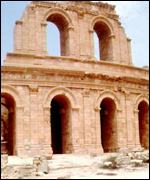
Sabratha: 4th-century Roman ruins
|
6th century BC - Carthage conquers Tripolitania.
4th century BC - Greeks colonise Cyrenaica in the east of the country, which they call Libya.
74 BC - Romans conquer Libya.
6th century AD - Libya becomes part of the Byzantine empire.
643 - Arabs under Amr Ibn al-As conquer Libya and spread Islam.
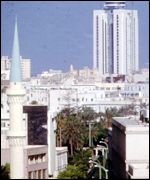
Tripoli skyline
|
16th century - Libya becomes part of the Ottoman
Empire, which joins the three provinces of Tripolitania, Cyrenaica and
Fezzan into one regency in Tripoli.
1911-12 - Italy conquers Libya.
1920s - Libyan resistance to Italian rule begins under the leadership of the Sanusi dynasty and Umar al-Mukhtar.
1942 - Allies oust Italians from Libya, which is
then divided between the French, who administer Fezzan, and the
British, who control Cyrenaica and Tripolitania.
Independence and oil
1951 - Libya becomes independent under King Idris al-Sanusi.
1956 - Libya grants two American oil companies a concession of some 14 million acres.
1961 - King Idris opens a 104-mile pipeline,
which links important oil fields in the interior to the Mediterranean
Sea and makes it possible to export Libyan oil for the first time.
The Gaddafi era
1969 - King Idris deposed in military coup led by
Col Muammar Gaddafi, who pursues a pan-Arab agenda by attempting to
form mergers with several Arab countries, and introduces state
socialism by nationalising most economic activity, including the oil
industry.
1970 - Libya orders the closure of a British
airbase in Tobruk and the giant US Wheelus air force base in Tripoli;
property belonging to Italian settlers nationalised.
1971 - National referendum approves proposed
Federation of Arab Republics (FAR) comprising Libya, Egypt and Syria.
However, the FAR never takes off.
1972 - Libya and Egypt agree on a merger, but this fails to materialise.
Institutionalised chaos
1973 - Col Gaddafi declares a "cultural
revolution", which includes the formation of "people's committees" in
schools, hospitals, universities, workplaces and administrative
districts; Libyan forces occupy Aozou Strip in northern Chad.
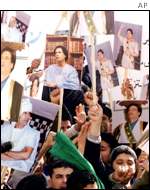
Pro-Gaddafi rallies have become a regular feature of Libyan life
|
1974 - Libya and Tunisia agree on a union state - the "Islamic Arab Republic" - but this proves to be stillborn.
1977 - Col Gaddafi declares a "people's
revolution", changing the country's official name from the Libyan Arab
Republic to the Socialist People's Libyan Arab Jamahiriyah and setting
up "revolutionary committees" - heralding the start of
institutionalised chaos, economic decline and general arbitrariness.
1980 - Libya and Syria agree on a merger, but
this too fails to materialise; Libyan troops start intervening on a
large scale in civil war in northern Chad.
Confrontation with the US
1981 - US shoots down two Libyan aircraft which
challenged its warplanes over the Gulf of Sirte, claimed by Libya as
its territorial water.
1984 - UK breaks off diplomatic relations with
Libya after a British policewoman is shot dead outside the Libyan
People's Bureau, or embassy, in London, while anti-Gaddafi protests
were taking place.
1986 - US bombs Libyan military facilities,
residential areas of Tripoli and Benghazi, killing 101 people, and
Gaddafi's house, killing his adopted daughter. The US said its raids
were in response to alleged Libyan involvement in the bombing of a
discotheque in Berlin frequented by American military personnel.
1988 - Gaddafi orders the release of some political prisoners and embarks on limited economic liberalisation.
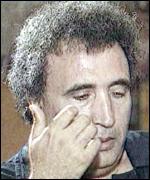
Abdelbaset al-Megrahi: sentenced to life for Lockerbie bombing
|
1989 - Libya, Algeria, Morocco, Mauritania and Tunisia form the Arab Maghreb Union.
Lockerbie
1992 - UN imposes sanctions on Libya in an effort
to force it to hand over for trial in the UK or the US two of its
citizens who are suspected of involvement in the blowing up of a Pan-Am
airliner over the Scottish town of Lockerbie in 1989.
1994 - Libya returns the Aozou Strip to Chad.
1995 - Gaddafi expels some 30,000 Palestinians
in protest at the Oslo accords between the Palestine Liberation
Organisation and Israel.
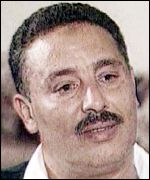
Al-Amin Fahimah: found not guilty
|
1999 - Lockerbie suspects handed over for trial
in the Netherlands under Scottish law; UN sanctions suspended;
diplomatic relations with UK restored.
2000 September - Dozens of African immigrants are
killed by Libyan mobs in the west of Libya who were said to be angry at
the large number of African labourers coming into the country.
2001 31 January 2001 - Special Scottish court in
the Netherlands finds one of the two Libyans accused of the Lockerbie
bombing, Abdelbaset Ali Mohamed al-Megrahi, guilty and sentences him to
life imprisonment. Megrahi's co-accused, Al-Amin Khalifa Fahimah, was
found not guilty and freed to return home.
2001 May - Libya sends in troops to help quell a coup attempt against President Ange-Felix Patasse of the Central African Republic.
2001 19 June - Libya says its troops have
returned from the Central African Republic, except for a small
contingent which was left behind "at the request of President
Ange-Patasse ... to train the Central African Republic's army and the
president's personal guard".
2002 January - Libya and the United States say
they have held talks to mend relations between them after years of
hostility over what the Americans have termed Libya's sponsorship of
terrorism.
2002 14 March - The Libyan man found guilty of
the Lockerbie bombing, Abdelbaset Ali Mohmed al-Megrahi, loses his
appeal against the conviction and begins a life sentence of at least 20
years.
2002 August - Libya says it is ready, in principle, to pay compensation to families of victims of the Lockerbie bombing.
2003 January - Libya is elected chairman of the
United Nations Human Rights Commission despite opposition from the US
and human rights groups.
|
